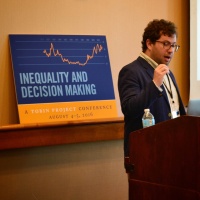Tobin Project Holds Conference on Inequality and Decision Making

On August 4th and 5th, the Tobin Project convened a Conference on Inequality and Decision Making, bringing together leading scholars from across the social and behavioral sciences to explore the effects of economic inequality on individual behavior and decision making. Across two days of in-depth discussion, participants examined the ways in which rising inequality might influence the perceptions, beliefs, and behaviors of Americans. By focusing on individual decision making, we aimed to improve understanding of the mechanisms through which inequality affects our democracy, economy, and society as a whole.
The Conference on Inequality and Decision Making owes its success to the innovative work of the scholars who presented pilot projects and the invaluable support of several pioneers from academia who led rich group discussions. Seventeen pilot projects were presented and workshopped at the conference. Participants collaborated to identify promising directions for new inquiry and evaluate new methods for the study of the behavioral effects of inequality. Pilot projects utilized a range of innovative approaches, including:
- Linking and analyzing data from the Department of Education, Zillow, and a national panel survey of American families to test the relationship between income inequality and competition for housing in desirable school districts;
- Modeling economic inequality in the laboratory, to study whether higher levels of inequality cause changes in the ways that individuals conceptualize social class; and
- Surveying large numbers of adults to assess whether different features of their commute, workplace, and social media network influence the degree of inequality they perceive in society.
Leaders from academia and government shared important insights and provided feedback on the research presented. For instance, Rep. Joseph P. Kennedy III, currently in his second term representing Massachusetts’ 4th congressional district, offered a policymaker’s perspective on the importance of understanding inequality and its consequences. Susan T. Fiske (Princeton University, Psychology), a leader in the study of social cognition, moderated a session exploring the relationship between economic inequality and beliefs about deservingness. Mitchell B. Weiss (Harvard Business School) drew on his experiences as Chief of Staff to the Mayor of Boston and as founding Executive Director of the Tobin Project to lead a conversation on how strategically chosen research questions might further our understanding of economic inequality and its behavioral effects. We are grateful to all participants for their meaningful contributions to the conference’s discussions and for their work in advancing this important research agenda.
The Tobin Project also owes special thanks to the scholars sitting on the Conference Advisory Board, who for the last year have worked closely with Tobin to plan and structure this meeting. We are enormously grateful for their insight and commitment to cultivating new research aimed at understanding how rising inequality affects American society.
Conference Advisory Board:
- Nancy Adler (University of California, San Francisco, Psychology)
- Marianne Bertrand (University of Chicago Booth School of Business, Economics)
- Raymond Fisman (Boston University, Economics)
- Ilyana Kuziemko (Princeton University, Economics)
- Wendy Berry Mendes (University of California, San Francisco, Psychology)
- David Moss (Harvard Business School)
- Michael Norton (Harvard Business School)

